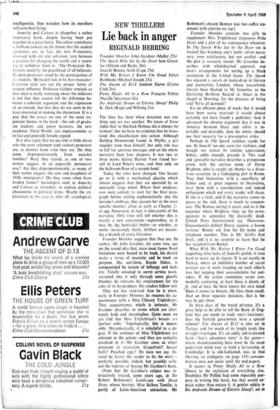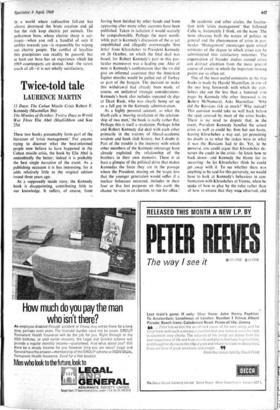NEW THRILLERS
Lie back in anger
REGINALD HERRING
Founder Member John Gardner (Muller 25s) The Spook Who Sat by the Door Sam Green- lee (Allison and Busby 30s) Snatch! Rennie Airth (Cape 25s) With My Knives I Know I'm Good Julian Rathbone (Michael Joseph 25s) The Ascent of D.I3 Andrew Garve (Crime Club 21s) Pretty Maids All in a Row Francois Pollini (Neville Spearman 42s)
Do Androids Dream of Electric Sheep? Philip K. Dick (Rapp and Whiting 21s)
The time has been when detection was one thing and sex was another. We know of Irene Adler that `to Sherlock Holmes she is always the woman'; but we have no evidence that he trans- lated this classification into action. Although Bulldog Drummond found, in Phyllis, a girl stupider even than himself, her only role was to fall for spurious messages and set the whole narrative back four chapters. It was two or three books before Harriet Vane found her- self in Lord Peter's arms, and then only on the ballroom floor of a seaside hotel.
Today the rules have changed. Our heroes go to it with a mechanical alacrity which almost suggests that they are operated by an unusually large wheel. Where their predeces- sors were content to wait for the final para- graph before settling euphemistically into the heroine's embrace, they possess her in the most specific manner, often as early as Chapter 2: et sqq. Possession, in fact, is nine-tenths of the narrative. Only time will tell whether this is merely a new convention—superseding, as it may be, the homicidal butler—or whether, as seems increasingly likely, thrillers are becom- ing a branch of erotic literature.
Founder Member suggests that they are. Its author, Mr John Gardner, hit some time ago on the sound idea that, since most James Bond imitations were bound to be trash, his should make a virtue of necessity and be trash on purpose. His anti-hero, Boysie Oakes, is compounded by nature of lethargy and lech- ery. Totally unsuited to secret service work, recruited into it only through some ghastly blunder, he tolerates his employment for the sake of its by-products. His readers follow suit.
They are less surprised than he is when, early in Founder Member, he resumes his ac- quaintance with a Miss Chicory Triplethrilst. That acquaintance, which is intimate, Mr Gardner describes in terms which are alter- nately bald and meaningless. Quite soon we are told that Miss Triplethrust's breasts are 'perfect orbs.' Topologically, this is impos- sible. Metaphorically, it is unhelpful to a de- gree. If the contours of Miss Triplethrust are relevant to the action—and they are certainly involved in it—Mr Gardner owes us either precision or evocation. Grapefruit? Soccer balls? Poached eggs? He does not say. In- stead he leaves the reader to do the work— perfectly possible, indeed, but possible with- out the expense of buying Mr Gardner's book.
(Note that Mr Gardner's subject was in- structively treated, some years ago, in Mr Robert Robinson's Landscape with Dead Dons, whose heroine, Miss Balboa Tomlin, is partly of Latin-American extraction. Mr Robinson's chosen likeness was two coffee ice- creams with cherries on top.)
Founder Member contains two girls to supplement Miss TripIethrust (imponere Pelio Ossa) and a plot of no consequence whatever. In The Spook Who Sat by the Door sex is treated like brushing one's teeth—often neces- sary, even satisfactory, but not soulful—and the plot is seriously meant. Mr Greenlee de- scribes, with wholehearted approval, one man's arrangements for setting up a black revolution in the United States. The Spook has enjoyed a succes de name-drop in literary and journalistic London, whose masochistic liberals have flocked to Mr Greenlee, as the Quivering Brethren flocked to Amos in the chapel at Howling, for the pleasure of being told 'Ye're all damned!'
It's an efficient piece of work; but it would have been worse received—it would almost certainly not have found a publisher—had it advanced the obverse argument that if war in America between black and white is in- evitable and desirable, then the whites should use their majority for a pre-emptive strike.
Perhaps in The Spook violence stands for' sex. In Snatch! no one cares for violence, and, though sex makes its routine appearance,, babies, oddly enough, precede it. This cool and agreeable narrative describes a prosperous crook with the curious name of Harry Brighton, who is caught up, thanks to a disis-, trous associate, in a kidnapping plot in .Rome. They find themselves with a superfluity of babies and, at great expense- to themselves, treat them with a consideration and indeed: enthusiasm which not every reader will share. If this is a fault, and if the narrative comes to pieces at the end, there is much to compen- sate. The Roman setting is exact, and so is the sequence where Brighton rings up the news- agencies to announce the dastardly deed. United Press International say Duocento- iinquantamila dolled! Bravo, signore, e buona fortuna.' Reuter ask him for his name and telephone number. This is Mr Airth's first book; and it is no surprise to learn that he has resigned from Reuter.
What With My Knives I Know I'm Good. (appalling title) lacks of,Snatch's polish, it triel, hard to make up in vigour. It is set mostly in Turkey, where an indefinite number of secret services are at work treading on each other's toes but keeping their assassinations for out- skiers. If the action sometimes seems irre- medially confusing, at least there is plenty of _if; and at least the hero knows his own mind 73Then it comes to breasts. He likes them small. And on three separate instances, that is the way he gets them.
In these days of the travel pittance, it's a great help to be able to tell the Bank of Eng- land that one needs to study one's locations: does the Turkish government have a special scheme? The Ascent of D.I3 is also set in Turkey, and for much of its length reads like straight travelogue. It's an oddly old-fashioned book—'boy's adventure story' is the genre— whose mountaineering hero must be the most pedestrian mind ever to hold a lectureship at Cambridge. It is old-fashioned, too, in that (barring an ambiguity on page 155) consum- mation does not occur until the end-papers.
It occurs in Pretty Maids All in a Row almost to the exclusion of everything else. Doubtless Mr Pollini had some reputable pur- pose iii writing this book, but that would ex- plain rather than excuse it. A gentler oddity is Do Androids Dream of Electric Sheep?, set in
in a world where radioactive fall-out has almost destroyed the brute creation and WI but the rich keep electric pet animals. The policeman hero, whose electric sheep is oat- tropic—when you roll a handful of oats it ambles towards you—is responsible for wiping out electric people. The conflict of loyalties this precipitates can readily be guessed; but at least our hero has an experience which hil) 1969 counterparts are denied. And—the rarest touch of all—it is not wholly satisfactory.



































 Previous page
Previous page